Y5 Real Stories vs Fantasy Stories
£3.00
KS2 National Curriculum:
✓ Identify conventions
✓ Compare text types
✓ Encourage independent learning
Activities in this lesson include looking at real vs fantasy stories, real vs imaginary settings, real vs imaginary characters and the conflict between good and evil. Activities include answering higher and lower order questions.
There is a five-minute evidence-based CPD activity at the end of this lesson which will develop classroom teachers’ skill set. This CPD consists of a research extract on thinking skills with a five-minute activity based on this extract.
Description
These evidence-based learning (EBL) lessons are based on classroom practice that has been proven, by research, to maximise thinking, learning and attainment. From an extensive review of educational research, we identified the eight key classroom thinking and learning skills that were common across these research papers. We named these eight key skills “EBL skills”.
EBL skills have been proven by research to maximise learning because they combine the most productive thinking skills with the most effective learning behaviours. Each of our evidence-based learning lessons uses the English curriculum as a framework through which the eight EBL skills are delivered.
Teachers also have the opportunity to add to their own skill set or refresh their existing skills with our five-minute CPD activity, based on one of the EBL skills used in this lesson.
The skills in bold below are the EBL skills developed in this Fantasy Story lesson. Click on each skill to learn more about that skill.
- Collaboration
- Thinking Skills
- Peer Assessment
- Peer Teaching
- Self-Assessment
- Metacognition
- Self-Regulation
- Independent Learning
1 review for Y5 Real Stories vs Fantasy Stories
Only logged in customers who have purchased this product may leave a review.
Related products
-
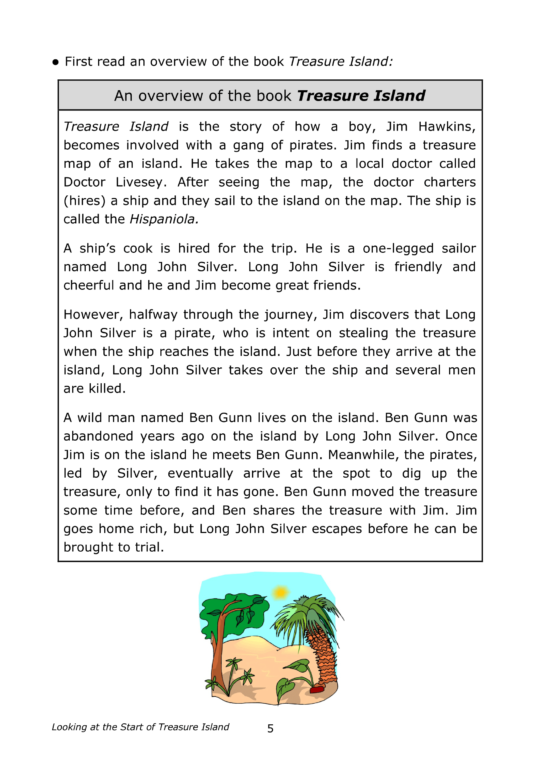
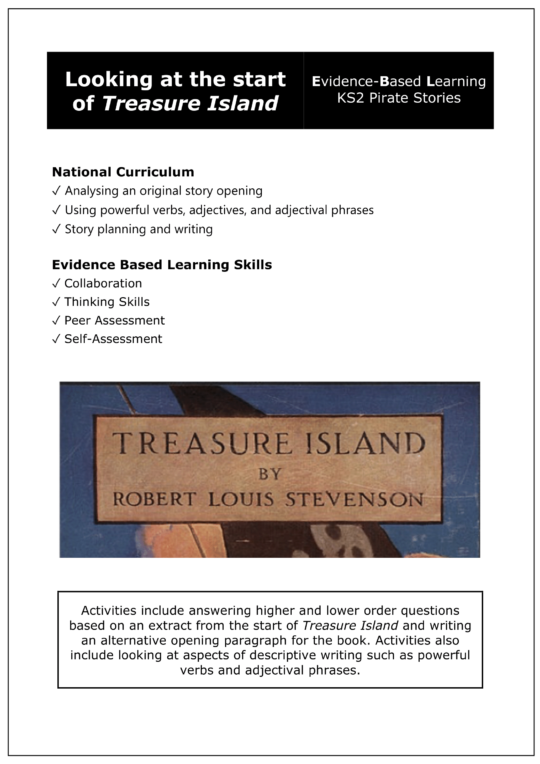
Y6 Looking at the Start of Treasure Island
£3.00 Add to basket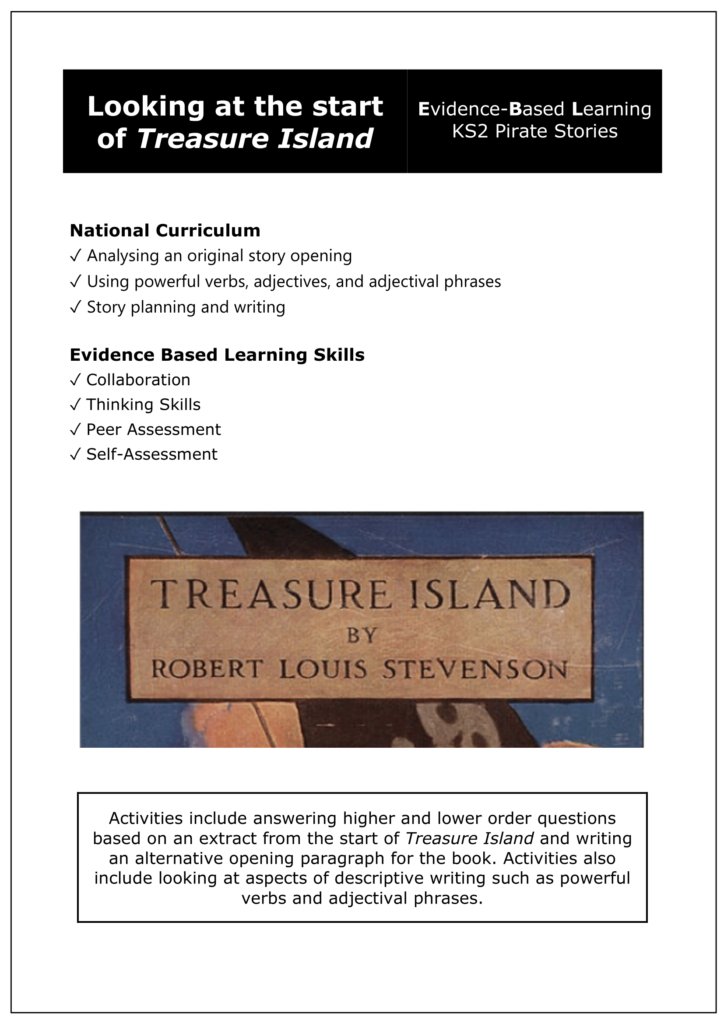 £3.00Add to basket
£3.00Add to basketKS2 National Curriculum:
✓ Analysing an original story opening
✓ Using powerful verbs, adjectives, and adjectival phrases
✓ Story planning and writingActivities include answering higher and lower order questions based on an extract from the start of Treasure Island and writing an alternative opening paragraph for the book. Activities also include looking at aspects of descriptive writing such as powerful verbs and adjectival phrases.
There is a five-minute evidence-based CPD activity at the end of this lesson which will develop classroom teachers’ skill set. This CPD consists of a research extract on thinking skills with a five-minute activity based on this extract.
VIEW -


Y5 Home Sweet Dome
£3.00 Add to basket £3.00Add to basket
£3.00Add to basketKS2 National Curriculum:
✓ Describing settings; using expanded noun phrases and rich vocabulary.
This lesson looks at settings in a science fiction story in detail, and it includes answering higher and lower order questions on the settings of a science fiction story, reading extracts from science fiction stories and identifying the setting of these extracts.
There is a five-minute evidence-based CPD activity at the end of this lesson which will develop classroom teachers’ skill set. This CPD consists of a research extract on peer assessment with a five-minute activity based on this extract.
VIEW -

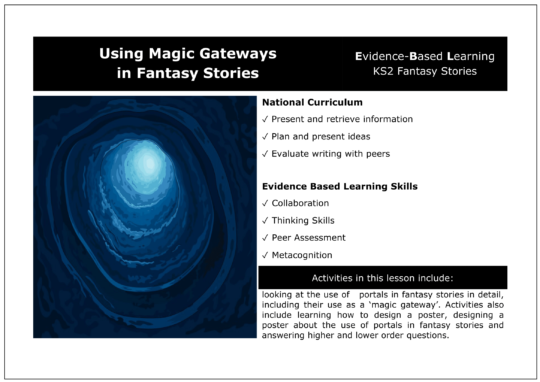
Y6 Using Magic Gateways in Fantasy Stories
£3.00 Add to basket £3.00Add to basket
£3.00Add to basketKS2 National Curriculum:
✓ Present and retrieve information
✓ Plan and present ideas
✓ Evaluate writing with peersActivities in this lesson include looking at the use of portals in fantasy stories in detail, including their use as a ‘magic gateway’. Activities also include learning how to design a poster, designing a poster about the use of portals in fantasy stories and answering higher and lower order questions.
There is a five-minute evidence-based CPD activity at the end of this lesson which will develop classroom teachers’ skill set. This CPD consists of a research extract on metacognition with a five-minute activity based on this extract.
VIEW -


Y6 Improving Creative Writing using Fantasy Stories
£3.00 Add to basket £3.00Add to basket
£3.00Add to basketKS2 National Curriculum:
✓ Plan, write and evaluate narrative
✓ Describe settings and characters
✓ Use dialogue effectivelyActivities in this lesson include a fantasy-based creative writing task including how writing can be improved. Three paragraphs have to be written for the opening of a fantasy story. This lesson also looks at past tense, first person, punctuation, using adjectives and the rules of dialogue.
There is a five-minute evidence-based CPD activity at the end of this lesson which will develop classroom teachers’ skill set. This CPD consists of a research extract on metacognition with a five-minute activity based on this extract.
VIEW


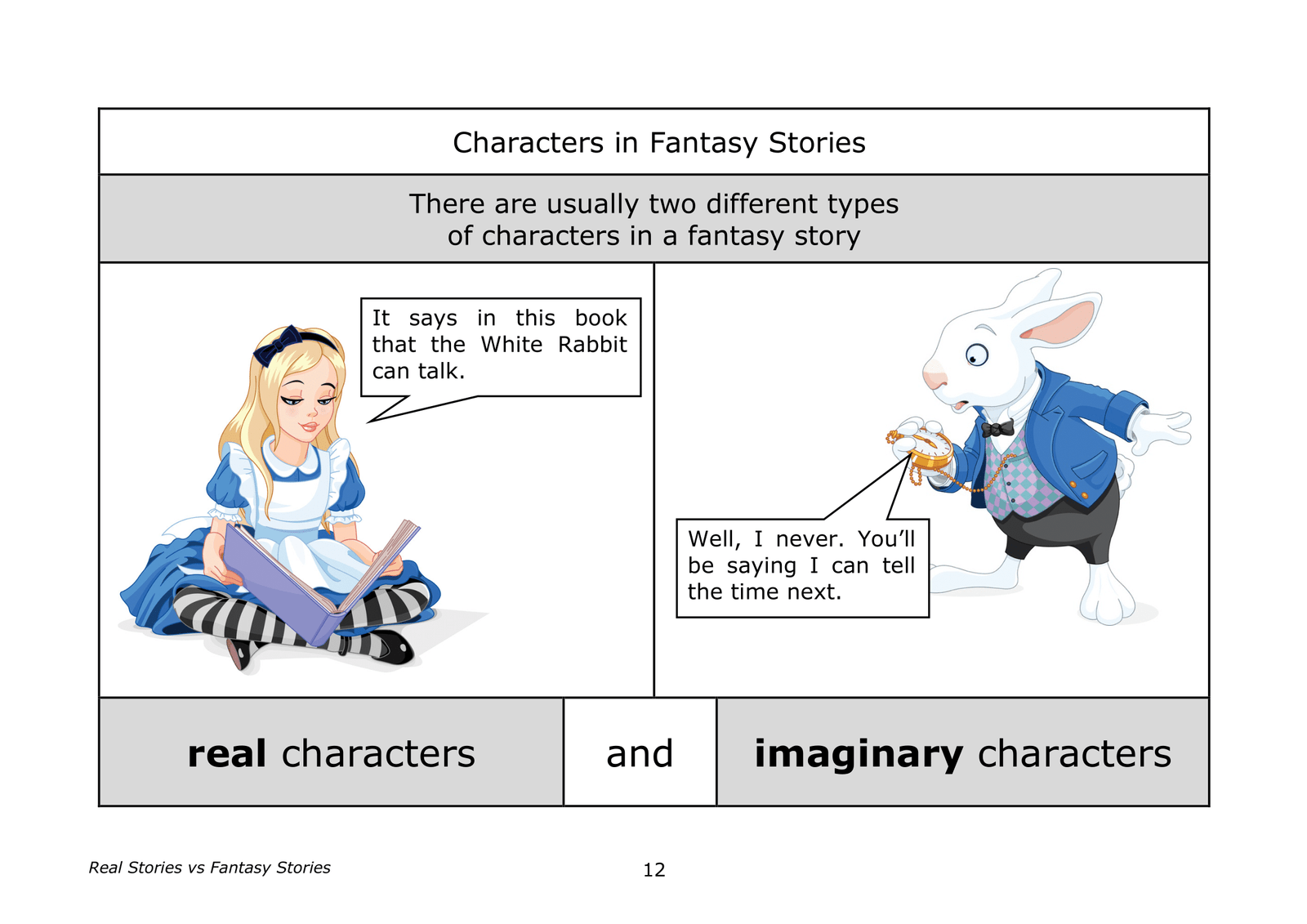



Philipem (verified owner) –
We asked a.i. to review this lesson. This is what it said:
Teachers – Engaging New Lesson on Fantasy vs Reality Rating: ⭐⭐⭐⭐⭐
I’ve discovered a superb KS2 English on the theme of fantasy vs real stories – “Real Stories vs Fantasy Stories”. It’s an absolute gem for secretly developing advanced learning skills.
This lesson analyses the key differences between fantasy tales and stories based on reality. Students study real vs imaginary settings and characters, learning how fantasy incorporates both.
Activities then extend this knowledge by getting pupils to apply their understanding. For example:
“The teapot and the caterpillar above are both imaginary. What does the word imaginary mean?”
As well as literacy objectives, these activities build vital skills like critical thinking, independent learning and self-regulation.
There’s even a 5 minute CPD activity on the research evidence for teaching thinking skills, allowing you to boost your professional expertise.
So if you want a brilliant English lesson that incrementally develops cognitive skills, this fantasy vs real resource comes highly recommended.